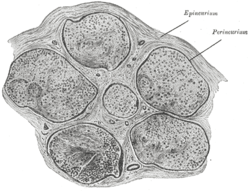Funiculus (neuroanatomy)
A funiculus is a small bundle of axons (nerve fibres), enclosed by the perineurium. A small nerve may consist of a single funiculus, but a larger nerve will have several funiculi collected together into larger bundles known as fascicles. Fascicles are bound together in a common membrane, the epineurium.[1][2]
| Funiculus | |
|---|---|
 Transverse section of human tibial nerve. | |
| Identifiers | |
| TA | A14.1.00.010 |
| FMA | 76738 |
| Anatomical terms of neuroanatomy | |
Funiculi in the spinal cord are portions of white matter.[3] Examples include:
- Anterior funiculus of the spinal cord
- Lateral funiculus of the spinal cord
- Posterior funiculus of the spinal cord
- Funiculus separans of the rhomboid fossa
References
This article incorporates text in the public domain from page 728 of the 20th edition of Gray's Anatomy (1918)
- Gray, Henry; Lewis, Warren Harmon (1918). Anatomy of the human body. Harold B. Lee Library. Philadelphia : Lea & Febiger.
- Siegel, A. & Sapru, H. (2011). Essential neuroscience. Philadelphia: Wolters Kluwer Health/Lippincott Williams & Wilkins.
- "Spinal Cord White Matter".
This article is issued from Wikipedia. The text is licensed under Creative Commons - Attribution - Sharealike. Additional terms may apply for the media files.